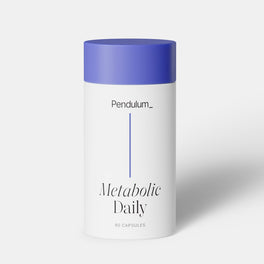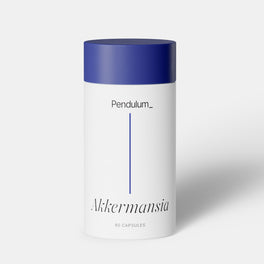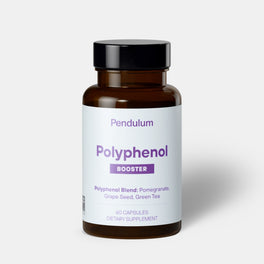Looks like your
cart is empty

Metabolic Daily
Improve metabolism

Akkermansia
Improves gut health

Polyphenol Booster
Increase antioxidants to protect cells
Stay in touch about special discounts, nutrition tips and additional education.
Looks like your
cart is empty

Improve metabolism

Improves gut health

Increase antioxidants to protect cells
Berberine is a compound found in certain plants that’s gained some recent buzz as a supplement to support healthy glucose metabolism and weight maintenance. Turns out, science backs up some of the hype. Berberine is not a magic bullet, but research shows it can be a helpful tool when used under the guidance of a healthcare provider.
Occasionally, a supplement that’s been around for thousands of years suddenly lands in the spotlight, especially in the age of social media. Berberine is a key example.
It’s a plant compound that’s been used in Ayurvedic and Chinese medicine since 650 B.C. However, in recent years, berberine has garnered attention for its potential to support healthy glucose (blood sugar) metabolism and cholesterol levels and help people maintain a healthy weight, among other benefits.
Instagram alone has tens of thousands of posts with the hashtag #berberine. Why? Social media posts call the supplement “nature’s Ozempic” or ”nature’s metformin,” but these comparisons oversimplify its function. Yes, berberine is a natural supplement with some evidence-based benefits for metabolic health and more. But, while berberine may influence glucose and insulin regulation, it works differently than prescription medications and should not be viewed as a replacement.
I personally heard about berberine while researching longevity topics for a health article. I dug into the science, asked my doctor about it, ordered the supplement, and have been taking the yellow capsule ever since. The aim is to help support my glucose metabolism throughout perimenopause, a time when your metabolic health can undergo changes. (Remember, it’s important to consult your own provider before taking berberine because it can interact with certain medications.)
If you’re like me and have heard about the supplement, you may be curious about it. You may be wondering about the benefits of berberine, whether the supplement can indeed support metabolic health, what the compound is exactly, whether it’s safe, how to take berberine, and more. Let’s dive in.
Berberine is a compound found in parts of plants in the Berberidaceae family, including European barberry, goldenseal, and tree turmeric. It’s often sold as a capsule for people to easily take it as a supplement.
Berberine use dates back at least 3,000 years in some cultures. Historically, berberine has been used for treating certain types of ailments, infections, and more. (If you suspect you have an infection or other condition, always consult a health care provider about the best treatment for your unique situation.)
Recently, berberine’s potential to help with metabolic health has come to light. Metabolic health is a term describing how well the body processes and generates energy, which clinicians assess based on five biomarkers:
Clinicians consider a person to be metabolically healthy if all these metrics are in the “normal” range. If three or more are out of range, then the patient has metabolic syndrome (MetS), which increases the risk for heart attack, stroke, and other serious health outcomes.
Lifestyle changes, including taking some supplements, can help support metabolic health. Here’s a look at what we know about berberine and its effectiveness.

What does berberine do, exactly? Emerging research supports several potential health benefits of berberine, especially in metabolic health. However, while promising, much of the evidence comes from small studies or short-term trials. The existing evidence points to benefits related to metabolic health, but the supplement may also support different aspects of health, including the following.
“Berberine increases insulin receptor expression, enhancing the body’s response to insulin and facilitating glucose uptake into cells,” says Jennifer Agha-Khan, MS, RDN, at Pendulum Therapeutics.
Understanding why your body’s response to insulin, aka insulin sensitivity, is important requires a quick look at how your body metabolizes glucose.
Issues can occur when your body becomes insulin resistant, meaning you have a decreased response to insulin compared with someone with normal insulin sensitivity. Insulin resistance can lead to higher glucose levels in the bloodstream, which increases the risk of developing prediabetes and type 2 diabetes.
A 2022 research review investigated 37 studies involving more than 3,000 patients with type 2 diabetes. The researchers found that berberine modestly lowered fasting glucose and hemoglobin A1C (HbA1C or A1C), two metrics used to assess blood sugar.
Berberine may lower blood sugar through a couple mechanisms. “It activates AMP-activated protein kinase (AMPK), a key regulator of energy metabolism,” Agha-Khan says, “which helps reduce hepatic glucose production and improves insulin sensitivity.”
Berberine may also slow the absorption of glucose from food in your gut, reducing a potential glucose spike after eating. Frequent glucose spikes contribute to insulin resistance, while keeping blood sugar more stable makes you more insulin sensitive.
Insulin resistance and obesity share links and have a complex relationship.
Insulin resistance can cause hyperinsulinemia (high insulin) and affect hormones that regulate appetite, both of which could drive excess calorie intake and lead to weight gain or obesity.
A 2020 research review looking at 12 berberine studies found that the supplement is associated with a modest but significant lowering effect on participants’ body weight, body mass index, and waist circumference.
Berberine could help, thanks to its role in increasing glucagon-like peptide-1 (GLP-1), a natural gut hormone that supports glucose metabolism, insulin sensitivity, and appetite control. Berberine appears to increase GLP-1 by:
“Berberine influences the gut microbiome,” Agha-Khan says. The gut microbiome includes the beneficial and harmful microbes that live in the digestive tract. More specifically, she explains, berberine increases beneficial microbes linked to improved metabolic health, like Akkermansia muciniphila, Bacteroides, Bifidobacterium, and Lactobacillus. It also helps foster a healthier gut environment by reducing harmful microbes, such as Escherichia coli.
Although the mechanisms aren’t fully understood yet, berberine appears to support cardiovascular health in a few ways:
Berberine’s health benefits also extend specifically to women.
Many people with polycystic ovary syndrome (PCOS) also have insulin resistance. Supplementing with berberine, which aids insulin sensitivity, may help counter this.
During perimenopause and beyond, the decline in estrogen levels can change the body’s glucose metabolism, making you more susceptible to high glucose levels and insulin resistance. “Berberine may be a way to help control this via a natural supplement that does not require a prescription,” Agha-Khan says.
Mood changes, such as an increase in anxiety, are also common during perimenopause, but berberine may positively affect mental health by improving gut bacteria. Research has shown that the gut and brain communicate with each other via the gut-brain axis and that gut microbiota plays a significant role in this communication.

Berberine is generally considered safe when used as directed and under the guidance of a healthcare provider.
However, clinical studies evaluating berberine’s metabolic benefits typically range from 8 to 16 weeks. Long-term safety beyond six months has not been well studied, so discuss any ongoing use with your provider.
If you are considering taking berberine as a supplement, your provider can identify any potential interactions with your other medications, including those for diabetes, cholesterol, cardiovascular health, and more. They can also advise you on a dosage that’s safe for you and when you should take it.
“According to the literature,” says Christina O’Connor, RD, with Pendulum Therapeutics, “[berberine] should be taken approximately 30 minutes before meals to minimize blood sugar spikes and prevent any gastrointestinal side effects.” She adds that the maximum dose is 900-1500 milligrams per day, with the doses split up three to four times throughout the day.
Keep in mind that, as with any medication or supplement, berberine may cause side effects. Berberine side effects tend to be gastrointestinal, such as mild constipation or diarrhea.
You should not use berberine if you are pregnant or breastfeeding or if you have low blood sugar or low blood pressure, says O’Connor.
Here are a few other nature-derived supplements that, like berberine, may benefit cardiovascular health, glucose metabolism, and beyond.
Berberine has beneficial effects on the gut microbiome, but so do probiotics. Some of berberine’s benefits appear to come from its ability to stimulate the growth of the strain Akkermansia muciniphila, in the digestive tract, according to animal studies. Rather than taking berberine for this effect, you can take Akkermansia probiotics directly to help populate this strain in your gut.
Supporting your cardiovascular health could be as easy as opening your spice cabinet. A compound found in turmeric, curcumin has been shown to reduce inflammation by serving as an antioxidant.
Cinnamon, another spice, comes from the inner bark of Cinnamomum trees. But it isn’t just for apple pie and cider. A 2024 review of 24 clinical trials found that cinnamon lowers fasting blood sugar and HbA1c. Sprinkle it on oatmeal, yogurt, coffee, etc., for its beneficial effects on blood sugar.
Your body produces alpha-lipoic acid (ALA), an antioxidant, but you can get more through foods or supplements. Some research points to ALA’s potential for supporting insulin sensitivity. Foods with ALA include red and organ meats, vegetables, and nuts and seeds.
Inositol is a sugar your body produces, but it is also present in certain foods (meat, fruit, legumes, and grains) and available as a supplement. It provides cellular structure and is involved in cellular signaling. Research shows it may have some beneficial effects on insulin sensitivity, glucose metabolism, lipid profiles, and more.

Berberine may be right for you if you are looking for a natural tool to help maintain a healthy weight, or help support blood sugar metabolism, insulin sensitivity, cardiovascular health, and more, in conjunction with lifestyle changes.
However, individuals with heart failure, chronic kidney disease, liver disease, or those on multiple medications should consult a clinician before using berberine to avoid unintended interactions or risks.
“I typically always recommend at least trying alternative or natural remedies first before medications in the right situations,” O’Connor says. “Sometimes, simply restoring the nutrients or tools your body needs is all it takes to allow for course correction.” She adds, “Always consult a doctor before starting a new herb or supplement.”
For me, berberine is one of the natural ways I manage my metabolic health and the changes associated with perimenopause. It’s not my only tool, but one that’s in my arsenal—along with taking additional provider-greenlit supplements, eating a healthy diet, and getting oodles of physical activity.
Berberine is a supplement that may help support healthy glucose metabolism, insulin sensitivity, cardiovascular health, and more.
One of berberine’s primary functions is to trigger AMPK, an enzyme that’s essential for metabolism—the process in which your body turns food into energy. Berberine may help slow digestion, so you feel full sooner, and help improve insulin sensitivity (your body’s ability to effectively respond to insulin).
Berberine is generally considered safe when used under the guidance of a healthcare professional. If you take it every day, you may notice improvements in glucose metabolism, insulin sensitivity, cardiovascular health, and more. It may also help you maintain a healthy weight. However, you should consult your provider before taking berberine. They can recommend how often you should take it and may suggest cycling: either taking breaks from the supplement or temporarily swapping it with another.
Berberine has been shown to reduce weight, body mass index, and waist circumference. Early research done on cells in a lab shows that berberine may reduce visceral fat, the type of fat stored deep in the abdomen that surrounds organs and is linked to obesity and adverse health outcomes. By reducing visceral fat, berberine may be able to reduce overall belly fat.
Berberine can interact with a number of medications, including antidiabetic agents, blood thinners, and drugs processed by cytochrome P450 enzymes. Always review supplement use with your healthcare provider.
Content is for educational purposes only and has not been evaluated by the Food & Drug Administration. Statements and products are not intended to diagnose, treat, cure, or prevent any disease.